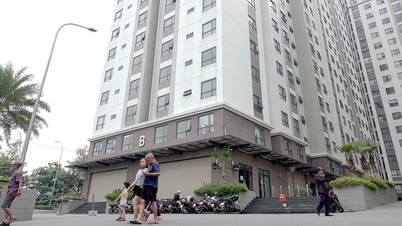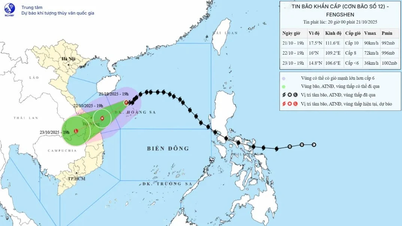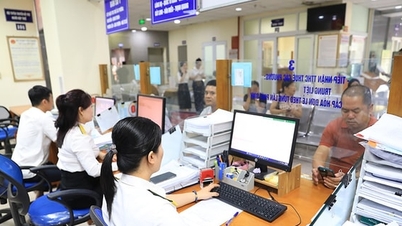
Many people do not reap the benefits of walking - Photo: GI
Walking a lot but still not losing weight?
According to the World Health Organization (WHO), just 30 minutes of brisk walking a day can help reduce the risk of cardiovascular disease, type 2 diabetes, depression and many other metabolic diseases.
Research from the US Centers for Disease Control and Prevention (CDC) also shows that regular walking improves circulation, increases respiratory capacity, reduces blood pressure, aids in weight control and increases longevity.
The image of groups of middle-aged people strolling around the park in the early morning or late afternoon has become a familiar part of urban life.
However, beneath those optimistic promises, many people after many months of persistently walking 30 - 60 minutes every day see almost no weight loss results, nor any obvious changes in body shape or health.
Many people expressed disappointment when their “weight remains the same”, “their stomach does not get smaller” or “they still get tired easily like before”. The question is: why does such a strongly promoted method not bring practical results to many people?
According to WHO experts, the problem lies in the gap between medical recommendations and how people apply them.

Need to walk properly to lose weight - Photo: PA
Walking is beneficial for heart and circulatory health, but to effectively lose weight or improve fitness, intensity is key.
When walking too slowly or just at a leisurely pace, the heart rate is unlikely to reach the threshold needed to activate the fat-burning process. Dr. William Kraus, a cardiologist at Duke University, said that to be effective, the exerciser must maintain a heart rate in the “fat-burning” zone (ie, about 60-70% of maximum heart rate), which most recreational walkers do not achieve.
At a light level of exercise, a 60kg person only consumes about 80 - 100 kcal in 30 minutes, equivalent to the amount of energy of a small cookie.
Duration and frequency are also often misunderstood. Many people spend 30-60 minutes walking each day, but actually spend a lot of time doing other things, like checking their phones or taking breaks.
In fact, the 30 minutes a day recommendation is the minimum to maintain cardiovascular health, but not enough to create the energy deficit needed for weight loss.
According to WHO guidelines, to help control weight, adults need to walk briskly at least 300 minutes per week, equivalent to 5 sessions per week, each session from 45 - 60 minutes.
Many factors need to be combined
Another factor that is rarely mentioned is eating habits. Many people have the mentality of "after exercising, I have the right to eat more comfortably" so the amount of calories consumed after exercise is often higher than the amount of calories burned, making all efforts in vain.

Walking too leisurely is not effective - Photo: XR
Dr. Frank Hu, a nutritionist and epidemiologist at the Harvard TH Chan School of Public Health, emphasized that sustainable weight loss comes primarily from diet control, while exercise plays a supporting role. Just walking without adjusting your diet is unlikely to bring about a significant change in weight.
Walking technique also plays a big role. Many people just walk slowly, without swinging their arms or engaging their core, resulting in very low muscle activation.
As the body gets used to a simple rhythm of movement, the energy burning efficiency will decrease over time. In contrast, people who walk with long strides, fast speed and short acceleration periods often achieve significantly higher physical efficiency.
Additionally, simply walking without incorporating any form of strength training also results in little increase in muscle mass.
Muscle is the body's "fat burning factory". When it is not developed, the metabolic rate will slow down, making weight loss more difficult to achieve.
Fitness experts recommend combining brisk walking with light resistance exercises, such as squats, planks, or dumbbells, to optimize metabolic efficiency.
Walking is a healthy form of exercise, easy to do and suitable for almost all ages. However, to turn it into a truly effective tool in improving health and fitness, practitioners need to clearly understand the limits of this method, apply the right intensity, duration, and combine it with a nutritional regimen and other forms of exercise.
The promises from medicine are not wrong, but the actual effectiveness depends largely on how each person implements them.
Source: https://tuoitre.vn/vi-sao-di-bo-khong-giam-can-nhu-bac-si-hua-hen-20251020215942509.htm




![[Photo] Da Nang residents "hunt for photos" of big waves at the mouth of the Han River](https://vphoto.vietnam.vn/thumb/1200x675/vietnam/resource/IMAGE/2025/10/21/1761043632309_ndo_br_11-jpg.webp)
![[Photo] Prime Minister Pham Minh Chinh received Mr. Yamamoto Ichita, Governor of Gunma Province (Japan)](https://vphoto.vietnam.vn/thumb/1200x675/vietnam/resource/IMAGE/2025/10/21/1761032833411_dsc-8867-jpg.webp)
![[Photo] Prime Minister Pham Minh Chinh meets with Speaker of the Hungarian National Assembly Kover Laszlo](https://vphoto.vietnam.vn/thumb/1200x675/vietnam/resource/IMAGE/2025/10/20/1760970413415_dsc-8111-jpg.webp)




































































































Comment (0)